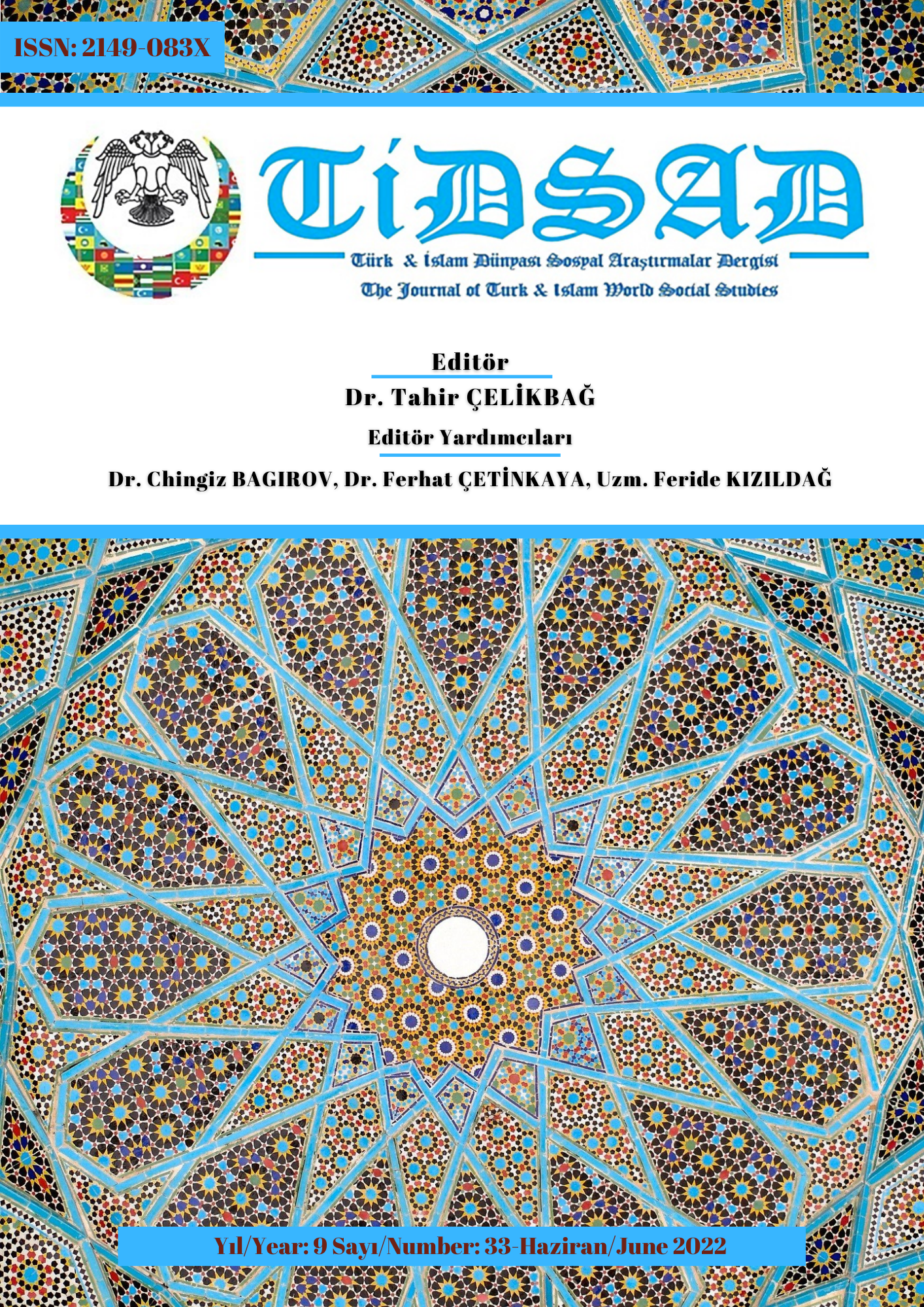Author :
Abstract
Yâsin sûresinde hakîm Kur’an’a yemin edilir, tevhid, nübüvvet ve âhiret konuları delillerle anlatılır. Elçilerin sırât-ı müstakîm üzere oldukları açıklanır. Allah-âlem ilişkisine ışık tutması hikmetiyle Rahmân, Rahîm, Rab, Aziz, Alîm ve Hallâk isimleriyle ilah tasavvuru sunulur. İnanç ve küfür mücadelesinde, inkâr ve küfür eylemleri nedeniyle ilahî gazaba uğramış geçmiş topluluklardan ders alma hikmeti ile tarihsel örnek verilir. İnsanın yaratılışı, doğması, büyümesi ve yaşlanması, ömrün en rezil çağına eriştirilmesi ölüme, sonrası yeniden yaratılışa da delildir. Ölü toprağın ilkbaharda canlanması, güneşle ayın düzenli hareketleri, geceyle gündüzün peşpeşe gelmesi, gemi ve benzeri taşınma vasıtaları, insan ve hayvanların yaratılışı gibi ilahî kudretin delilleri anlatılır. Bu nimetlerin şükür için yani insanların yararına huzur ve mutlulukları için değerlendirilmesi istenir. Peygamberlerin dini tebliğ karşılığı ücret istemedikleri, uğursuzluğun olmadığı, insanın kendi yaptıklarınızdan dolayı musibetlerin başına geldiği belirtilir. İlahi hikmetleri inkâr edenlerin gözlerine perde çekilir. Psikolojik perdelenme, insanın geçmişini geleceğini düşünmemesi, aklını, kalbini kilitlemesi, ibret almaması hikmetleri görmemesi sonucu gerçekleşir. Kendi sorumluluklarını reddederek başkalarına atanlar kınanırlar. Kıyamette mazeret uydurup yalan söyleyen ağızlar mühürlenir, eller konuşur ve ayaklar yaptıklarına tanıklık ederler. Şeytana kul olanlar, nefsî arzularına uyup hakkı, itikadî hikmetleri inkâr edenler, mü’minlerden ayrılıp cehenneme sevk edilirler. Allah’a kulluk edenler eş ve çocuklarıyla beraber her türlü nimet ve güzelliğin olduğu cennetlerdedir. Rahim Rablerinin sözü selâmı ile güven, esenlik, huzur ve mutluluk içindedirler. Buna göre insan dünyası ve âhiretini kendi yaptığı özgür eylemleriyle hazırlar. Yâsin sûresinde insanlığa sunulan itikadî hikmetler dün olduğu gibi günümüzde de fert ve toplumların inanç ve ahlâk problemlerine çözüm önerileri şeklinde düşünülebilir.
Keywords
Abstract
In Surah Yasin, the issues of tawhed, nubuwwah and the hereafter are ex-plained with evidence by swearing an oath to the prevailing Qur'an. The swears by the wise Qur’an. It is explained that the messengers are on the straight path (al-sırat al-mustakim). In order to shed light on the relationship between Allah and the world, the concept of a deity is presented with the names of the names of al-Rahman, al-Rahīm, al-Rab, al-Aziz, al-Alim and al-Hallak. In the struggle between faith and blasphemy, a historical example is given with the wisdom of taking lessons from past communities that have suffered divine wrath due to acts of denial and blasphemy. The creation, birth, growth and aging of man, the attainment of the most infamous age of life, death and the subsequent recreation are also evidence. The signs of divine power such as the revival of the dead land in spring, the regular movements of the sun and the moon, the alternation of night and day, ships and similar means of transportation, the creation of humans and animals are described. It is desirable that these blessings be evaluated with gratitude, that is, for the benefit of people for their peace and happiness. It is stated that the prophets do not ask for a fee for a religious message, there is no unfortunate, and there are misfortunes because of what a person has done. A veil is drawn over the eyes of those who deny the divine wisdom. The psychological veiling occurs as a result of the fact that a person does not think about his past and future, locks his mind, heart, does not take heed, does not see the wisdom. Those who refuse their own responsibilities and assign them to others are condemned. On the day of resurrection, the mouths of those who make excuses and lie will be sealed, and the hands will speak, and the feet will testify to what they have done. Those who worship Satan, follow their own souls, deny the truth and i’tiqad wisdom, and follow evil deeds will be separated from the believers and sent to hell. And those who worship Allah will be in gardens of bliss, with their spouses and children. They are in peace, security and happiness with the greeting of the word of their rahim God. Accordingly man prepares the world and the hereafter with his own free actions. The i’tiqad wisdom presented to humanity in surah Yasin can be considered as solutions to the problems of faith and morality of individuals and societies today, as they were yesterday.
Keywords
- Abdülcebbâr, K. (2013). Şerhu’l-usûli’l-hamse. (Cilt 2). Türkiye Yazma Eserler Kurumu Baş- kanlığı Yayınları.
- Eliaçık, R. İ. (2014). Yaşayan Kur’an. İnşa Yayınları.
- Ersoy, M. A. (2009). Safahat. İz Yayıncılık.
- Fârâbî, E. N. (1995). Siyasetü’l-medeniyye. Dâru Mektebetü’l-Hilâl.
- Gazâli, E. H. (2004). el-İktisad fi’l-i’tikad. Hikmet Neşriyat.
- İbn Haldûn, E. Z. V. (2016). Mukaddime. Dergah Yayınları.
- İbn Manzûr, E. F. C. (1992). Lisânu’l-Arab. Darü’s-sadr.
- İsfahanî, R. (2012). Müfredât. Çıra Yayınları.
- Kasapoğlu, A. (2011). Kur’an’ın psikolojik tefsiri. İnönü Üniversitesi İlahiyat Fakültesi Der- gisi, 2(1), 103-150.
- Kindî, Y. İ. (2003). Risâleler. Klasik Yayınları.
- İbn Sina, E. A. (1959). Fi’l Havf mine’l-mevt. Orhan Mete Matbaası.
- Mâtürîdî, E. M. (2005a). Kitâbü’t-tevhid. İslam Araştırmaları Merkezi Yayınları.
- ……………, (2005b). Te’vîlâtü’l-Kur’an. Mizan Yayınları.
- Mevdûdî, E. A. (1996). Tefhimu’l-Kur’an. İnsan Yayınları.
- Mukatil, S. (2016). el-Eşbah ve'n-nezair fi'l-Kur'ani'l-kerim. İşaret Yayınları.
- Nesefi, E. M. (2004). Tebsıratü’l-edille fi usuli’d-din. Diyanet İşleri Başkanlığı Yayınları.
- Okuyan, M. (2017). Hayatın İnşası için Yasin Sûresi Tefsiri. Üniversite Yayınları.
- Oral, O. (2020a). Habib en-Neccar’ın Antakya halkına tavsiye ettiği psikososyal hikmetler. Mehmet Akif Ersoy Üniversitesi SBE Dergisi, 31, 240-251.
- ………, (2020b). Mâtürîdî’ye göre kalp mühürlenmesinin psikososyal sebepleri. Turkish Studies, 15(1), 499-517.
- ………., (2022). Mâtürîdî ile Kâdî Abdülcebbâr’a göre Fâtiha sûresinde insanlığa sunulan hikmetler. İslami Araştırmalar, 33(1), 41-62.
- Râzî, F. (1981). Mefâtihu’l-gayb. Darü’l-Fikr.
- Topaloğlu, B. (2013). Yâsîn Sûresi. Türkiye Diyanet Vakfı İslâm Ansiklopedisi, (43/340- 341). TDV. Yayınları.
- Yazır, E. M. H. (1992). Hak dini Kur’an dili. Azim Dağıtım.
- Zemahşerî, E. K. (2016). el-Keşşâf. (Cilt 6). Türkiye Yazma Eserler Kurumu Başkanlığı Ya- yınları.





